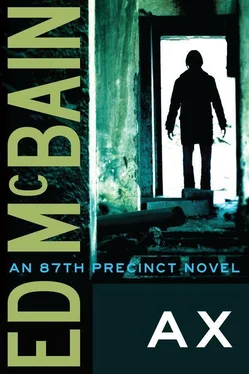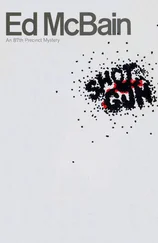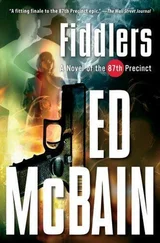They tried to see over the curtains on the front windows but found that they were hung on rods above their line of vision. Hawes went to the front door and tried it. It was locked.
“What do we do?” he asked. “I don’t see a bell, do you?”
“No. Why don’t you rap on the glass?”
“I’m afraid I’ll wake up all the Gypsies,” Hawes said.
“Try it.”
Hawes rapped on the glass. He looked at Carella, waiting. He rapped again. He took the door handle and shook the door. “Anybody in there?” he shouted.
“Don’t take it off the hinges,” a voice said.
“Ah-ha,” Carella said.
“Who is it?” the voice behind the door asked.
“Police,” Hawes said.
“What do you want?” the voice asked.
“We want to talk to The Happy Kids,” Hawes said.
“Just a minute,” the voice answered.
They waited. In a few moments, the door opened. The man standing in the door frame was perhaps ninety years old, give or take a few centuries. He leaned on his cane and peered out at the detectives malevolently, wheezing air into his sunken chest, his mouth twitching, his eyes blinking.
“Let’s see it,” he snapped.
“See what, sir?” Carella said.
“Your identification.”
Carella opened his wallet to his shield. The old man studied it and then said, “You’re not New Essex police?”
“No, sir.”
“Didn’t think so,” the old man said. “What is it you want?”
“George Lasser was murdered yesterday,” Carella said. “We understand he belonged to—”
“What? What did you say?”
“I said George Lasser—”
“Mister, don’t joke with an old man.”
“We’re not joking, sir,” Carella said. “Mr. Lasser was murdered yesterday afternoon.”
The old man in the door digested this silently for several moments, then nodded his head, and then sighed, and then said, “My name is Peter Maily. Come in.”
The store was furnished much as Carella had imagined it would be. There was a huge black potbellied stove against one wall, and over it some regimental flags and a group picture of some battle-weary soldiers taken just outside El Canay. A dilapidated couch was against the wall opposite the stove, and several stuffed and decaying easy chairs were scattered around the room. A television set was going in one corner, watched by two gloomy old men who barely glanced up as Hawes and Carella came into the room. If Peter Maily and these other two were The Happy Kids, they seemed to dispense a particular brand of somnolent gloom that was uniquely and exclusively their own. If ever there was a club that seemed singularly unclubby, this was it. Carella was certain that a smile on these premises would mean immediate expulsion from the group.
“You are The Happy Kids?” he asked Maily.
“Oh, yes, we’re The Happy Kids, all right,” Maily said. “What’s left of us.”
“And you did know George Lasser?”
“With us when we took Siboney and, later on, El Canay,” Maily said. “Picture’s up there on the wall, with the rest of us.” He turned to the men watching the television set and said, “Georgie’s dead, fellers. Got it yesterday.”
A bald-headed old man wearing a checked weskit turned away from the set and said, “How, Peter?”
Maily turned to Carella. “How?” he asked.
“Someone hit him with an ax.”
“Who?” the man in the checked weskit asked.
“We don’t know.”
The other man at the television set, straining to hear the conversation, cupped his hand behind his ear and said, “What is it, Frank?”
The man in the checked weskit said, “Georgie’s dead. Got killed with an ax. They don’t know who done it, Fred.”
“Georgie’s dead, did you say?”
“Yep, got killed with an ax.”
The other man nodded.
“We were wondering if you could tell us what you know about Mr. Lasser?” Carella said. “Anything that might help us to find his murderer.”
“Be happy to,” the man named Frank said, and the interrogation began.
The man who had opened the door, Peter Maily, seemed to be president of the group, which now consisted of three members, himself and the two who’d been watching the television set. The two television watchers were called Frank Ostereich and Fred Wye. Ostereich was secretary of the group, and Wye was treasurer—all chiefs and no Indians, it seemed. There had, however, been twenty-three Indians back in April 1898. Or, to be more exact, there had been twenty-three youngsters who were all in their late teens or early twenties, and they were members of a New Essex social and athletic club called The Happy Kids. It being 1898, there was no juvenile delinquency and therefore the term “social and athletic club” was not a euphemism for “bopping gang.” These happy kids actually had a baseball team and a volleyball team and a rented store—this same store they now rented on East Bond Street—in which they held dances every Friday night and sometimes necked with girls on weekday nights in the back room.
Well, in 1898, when the United States of America was suffering heavy economic losses in Cuba due to revolutions and guerrilla warfare and garrisoned Spanish towns, when the United States was simultaneously beginning to feel its oats in the Western Hemisphere and recognizing the importance of Cuba to Central America where a canal was being planned, two things happened: William Randolph Hearst published a letter from a Spanish minister in Washington, DC, written to a friend in Cuba and expressing contempt for President McKinley; and the United States battleship Maine was sunk in Havana harbor. Well, you know how it is with Cuba; one thing always leads to another. It wasn’t until April 24 that Spain officially declared war, at which time the American Congress replied by stating the two countries had been at war since April 21.
The Happy Kids enlisted as a group under W.R. Shafter and were part of the 17,000 US troops who landed in Cuba and began a march on Santiago. Considering the fact that there had been twenty-three boys in the social and athletic club, considering also how badly trained and poorly equipped the troops were, it was something of a miracle that The Happy Kids all survived the heavy fighting at Siboney and El Canay. None of the group was killed and only one man was wounded, a boy named Billy Winslow who took a Spanish slug in his calf. The bullet embedded in his leg enabled him in later years to predict accurately the kind of weather that could be expected on any given day in New Essex and the surrounding towns. This stunt made him very popular with the ladies and earned the respect and admiration of a girl named Janice Terrill, one of the prettiest girls in town, who— it was reputed—allowed young Billy to remove her petticoat and assorted sundry undergarments in the back room of the store one rainy afternoon he had predicted. They were married six months later.
As a matter of fact, of the twenty-three Happy Kids who survived the invasion of Cuba and the march through Siboney and El Canay, twenty were married by the turn of the century, and the remaining three—including George Nelson Lasser—were married shortly thereafter.
“What kind of a soldier was he?” Carella asked.
“Georgie? Same as the rest of us. Inexperienced, young, full of pepper. We’re lucky we all didn’t get our brains blown out.”
“What rank did he hold?”
“Private, first class.”
“Did he come right back to New Essex after he was discharged?”
“Yes.”
“What did he do?”
“Odd jobs. I guess he was trying to make up his mind. He always was an ambitious fellow, Georgie. I guess that was why he married Estelle. That was in 1904. January it was, matter of fact. That’s funny, isn’t it?”
Читать дальше












